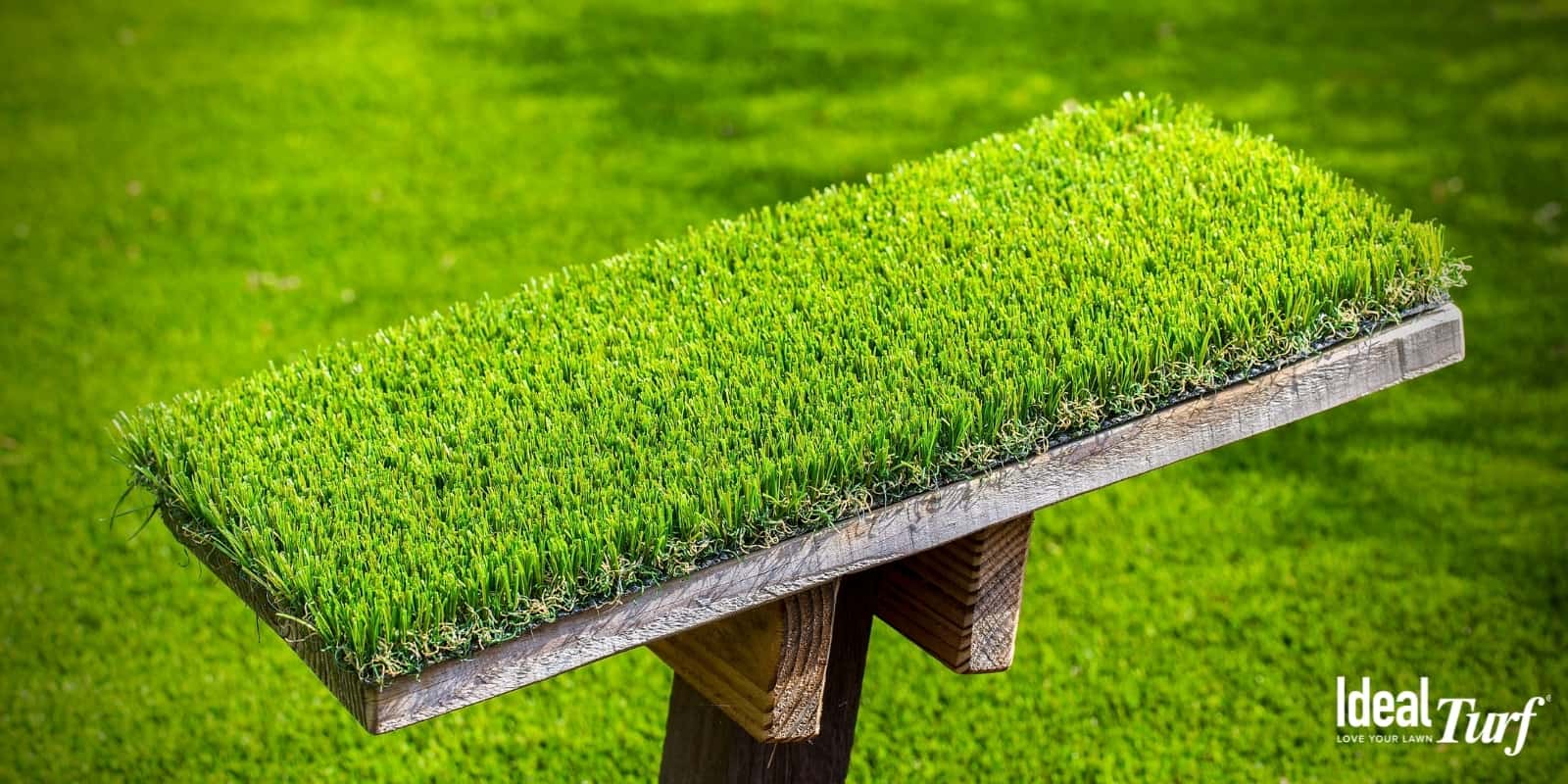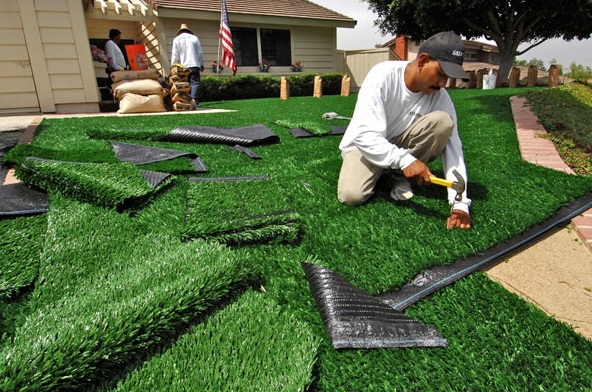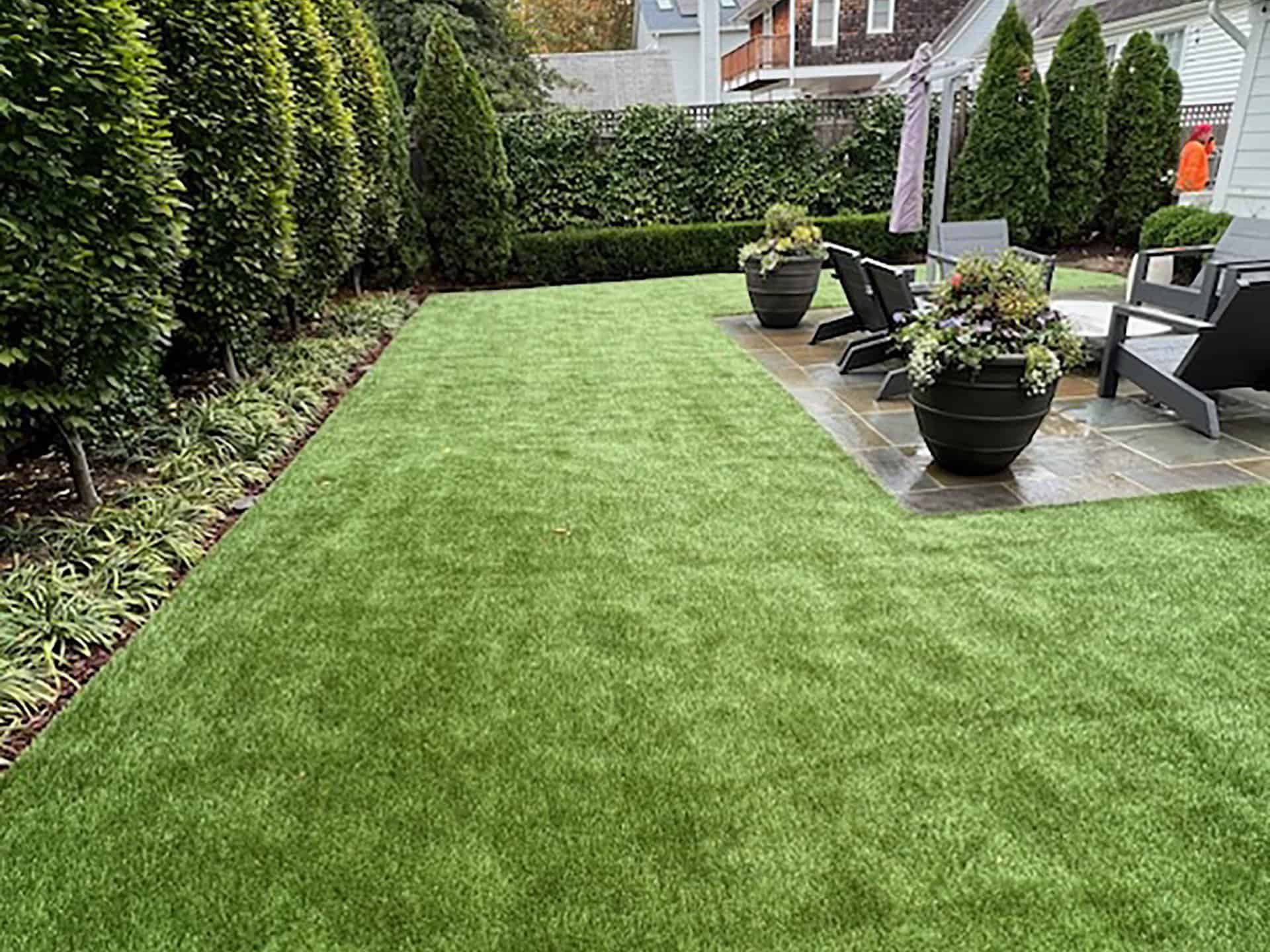Luxury Arizona Turf Installation Solutions for Residences and Businesses
Luxury Arizona Turf Installation Solutions for Residences and Businesses
Blog Article
Look Into the Environmental Perks of Opting for Synthetic Grass Solutions
The adoption of synthetic grass services offers a compelling opportunity to resolve pushing environmental obstacles. By substantially decreasing water usage and lessening the application of damaging chemicals, these alternatives not just promote lasting landscaping yet also shield regional ecosystems. The reduced carbon footprint linked with decreased upkeep activities contributes to an extra sustainable technique to land management. Nevertheless, the implications of these advantages prolong past simple preservation efforts, questioning regarding their long-term effect on environment conservation and overall environmental equilibrium. Exploring these dimensions exposes a complicated interaction worth taking into consideration.
Water Preservation Perks
Among one of the most significant advantages of artificial turf is its ability to conserve water. Typical yard yards call for considerable irrigation, especially in areas prone to drought or water constraints. On the other hand, man-made grass does not need watering, considerably reducing the total demand for water resources. This attribute is particularly valuable in deserts where water shortage is a pushing worry.
By removing the requirement for normal watering, synthetic grass contributes to sustainable landscape practices and assists minimize the ecological impact of excessive water intake. In addition, the preservation of water includes the reduction of drainage, which can lead to dirt erosion and waterway contamination.
Furthermore, the setup of synthetic grass permits home owners and municipalities to designate water resources a lot more successfully, concentrating on necessary usages such as alcohol consumption water and farming. The change towards synthetic turf not just advertises responsible water use however likewise lines up with more comprehensive environmental goals targeted at protecting natural deposits.
As communities significantly prioritize sustainability, the water conservation benefits of artificial lawn provide an engaging situation for its adoption in domestic and commercial landscaping jobs.
Lowered Chemical Usage
The shift to synthetic grass significantly decreases the reliance on chemical therapies frequently used in all-natural turf upkeep. Standard grass management usually includes the application of pesticides, plant foods, and herbicides to promote development and control bugs. These chemicals can present risks to human health, neighborhood wild animals, and the environment, adding to dirt and water contamination.
In comparison, man-made grass eliminates the demand for these unsafe compounds. As soon as mounted, it needs minimal maintenance, mostly including normal cleaning and seldom infill replenishment. This reduction in chemical usage not just benefits the instant environment yet also adds to wider ecological security. By minimizing the launch of synthetic substances right into the environment, synthetic grass promotes much healthier dirt and water systems.
Furthermore, the lack of chemical overflow related to fabricated turf installments aids protect regional waterways from pollution, sustaining water life and keeping biodiversity. Phoenix turf companies. As communities progressively prioritize sustainable methods, choosing for synthetic turf presents a sensible remedy that straightens with ecological conservation goals. Via this change, property proprietors can take pleasure in lush green areas without compromising ecological health, leading the way for an extra sustainable future
Reduced Carbon Impact

Moreover, the installation of synthetic grass can lead to substantial water preservation. All-natural grass call for considerable amounts of water for irrigation, which not only includes in the carbon impact connected with water extraction and treatment yet likewise pressures local water resources. In contrast, fabricated turf requires very little maintenance, needing no watering, thus considerably decreasing water use and its connected power costs.
Furthermore, the long life of synthetic grass adds to its decreased carbon influence. With a life expectancy of up to 15 years or even more, the requirement for constant replacements is lessened, resulting in less waste and lower power consumption in manufacturing and dealing with traditional grass alternatives. In general, synthetic grass presents a sustainable option for ecologically mindful landscaping.
Environment Preservation
Habitat preservation is an important consideration in the discussion over landscape design options, particularly when comparing synthetic grass to natural grass. Natural turf lawns usually require considerable maintenance, consisting of using fertilizers, herbicides, and chemicals, which can detrimentally impact neighborhood ecological communities. These chemicals can leach into the dirt and rivers, damaging indigenous plants and animals and disrupting neighborhood environments.
Artificial grass gets rid of the requirement for unsafe chemicals, therefore shielding nearby wild animals and preserving the honesty of surrounding ecological communities. The setup of synthetic grass can lead to the conversion of former grass locations right into even more biodiverse landscapes, go to this web-site such as pollinator yards or native plant locations, which can sustain local wildlife.
Eventually, the change to synthetic grass not only preserves water and reduces upkeep efforts but additionally fosters a more unified partnership in between human activities and the natural surroundings, advertising habitat conservation in the process.
Long-Term Sustainability
Long-term sustainability is an important consider evaluating the advantages of artificial turf over standard turf lawns. Among the most considerable advantages of man-made turf is its toughness; it can last up to 15-20 years with minimal upkeep, whereas all-natural turf needs regular reseeding and substitute. This durability reduces the demand for constant resources, such as water, plant foods, and chemicals, which are important for keeping a healthy and balanced grass yard.
In addition, synthetic grass adds to a reduction in carbon discharges connected with grass treatment equipment. Standard grass usually call for gas-powered mowers, leaners, and blowers, every one of which add to air contamination. Turf installation phoenix az. In comparison, synthetic grass gets rid of the requirement for such tools, advertising a cleaner setting
Furthermore, the manufacturing of fabricated turf progressively makes use of recycled products, enhancing its sustainability profile. As producers take on green methods, the ecological footprint of synthetic grass continues to reduce.

Verdict
The fostering of synthetic grass solutions provides considerable ecological advantages, including substantial water preservation, lowered reliance on harmful chemicals, and a reduced carbon footprint. Man-made turf help in protecting natural habitats by lessening land disruption and advertising lasting sustainability via the usage of durable materials. Collectively, these elements emphasize the potential of synthetic grass to contribute favorably to you could check here environmental health and wellness and provide a feasible alternative to conventional landscaping methods in a significantly resource-conscious world.
In contrast, fabricated lawn does not need watering, significantly decreasing the total demand for water sources. By reducing the launch of synthetic substances into the community, fabricated turf promotes healthier dirt and water systems.
Additionally, the installment of man-made lawn can result in significant water preservation. In comparison, man-made lawn requires marginal upkeep, requiring no watering, thereby considerably decreasing water use and its associated energy prices.

Report this page